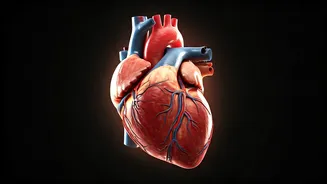Persistent Muscle Soreness
Delayed Onset Muscle Soreness (DOMS) is common after intense exercise. However, when the soreness lingers for several days and affects your ability to
perform daily activities, it could be a warning sign. Typically, if the pain persists despite adequate rest and persists for more than 72 hours, it's a signal to reassess your training schedule. It may mean you're pushing your muscles beyond their recovery capacity, possibly resulting in micro-tears that don't have enough time to heal properly. The body then experiences a breakdown. Prioritizing rest, and possibly modifying your workout intensity or frequency, can make a positive impact.
Constant Fatigue and Exhaustion
Feeling tired after a workout is expected, but persistent fatigue that doesn't improve with rest is another indication of overtraining. If you're constantly drained, even after sufficient sleep, it means your body isn't recovering from the stress of exercise. This constant state of exhaustion can compromise your energy reserves, affect your sleep quality, and make you more vulnerable to illness. To avoid this, include rest days in your routine, prioritize sufficient sleep, and consider decreasing the volume or intensity of your workouts to allow your body to recharge effectively.
Decreased Performance Levels
If you notice a decline in your performance, such as lifting less weight, running slower, or experiencing a decrease in endurance, it may indicate overtraining. Your body is likely struggling to adapt to the constant stress, leading to a plateau or even a regression in fitness gains. Consider the importance of progressive overload, meaning that you gradually increase the workload over time. However, if your body is not able to adapt, then you must reassess your plan and possibly take a break or reduce the intensity, allowing your body to recover and rebuild strength. This change helps regain lost performance.
Elevated Resting Heart Rate
An elevated resting heart rate can be a clear signal that your body is under stress. Normally, your resting heart rate should be within a certain range. If your resting heart rate is consistently higher than normal, it means your body is still in a state of stress from previous workouts. This sustained elevated state can indicate that your cardiovascular system is overworked, unable to fully recover, and in an overtrained state. In such cases, taking extra rest days and reducing the intensity of exercise will allow your heart rate to return to normal, letting your body heal and optimize the heart rate again.
Mood Swings and Irritability
Overtraining doesn't only affect your physical health; it can also impact your mental well-being. Increased irritability, mood swings, and a general feeling of being overwhelmed can be signs of overtraining. The constant physical stress can disrupt hormone balance, particularly affecting cortisol and testosterone levels. Moreover, the stress can also impact the adrenal glands, resulting in changes in mood. Including rest days, improving sleep quality, and incorporating stress-reducing activities can aid in rebalancing the hormones and enhancing overall mood and mental state.
Difficulty Sleeping Properly
While exercise can help improve sleep quality, overtraining can disrupt it. If you find yourself struggling to fall asleep, staying asleep, or experiencing restless sleep, it can be a sign of overtraining. Your body and mind are not able to relax as the sympathetic nervous system is always in high gear. Cortisol is elevated, disrupting the sleep cycle. Creating a sleep-friendly environment and sticking to a regular sleep schedule can help. This helps the body to relax, recover, and eventually improve the sleep cycle by regulating the body's natural rhythms.
Increased Frequency of Illness
Overtraining can weaken your immune system, making you more susceptible to infections and illnesses. The prolonged stress response can suppress immune function, leaving you vulnerable to common colds, flu, and other ailments. If you're constantly getting sick, despite a healthy lifestyle, it may be due to overtraining. Prioritizing rest, eating a balanced diet, and ensuring adequate sleep are vital to maintaining a strong immune system. Reduce the intensity or volume of your workouts to allow your body to recover.
Loss of Appetite and Weight
Overtraining can affect your appetite and even lead to unintended weight loss. This is often associated with elevated cortisol levels, which can suppress appetite. Furthermore, the body may not have enough energy to carry out the bodily functions, including appetite. In addition to this, inadequate nutritional intake can further compromise your recovery. In order to deal with this, you need to eat enough to fuel your workouts and support recovery. This entails consuming a balanced diet rich in calories, protein, carbohydrates, and healthy fats.
Increased Thirst and Dehydration
Overtraining can lead to increased dehydration. The metabolic processes involved during intense exercise can cause significant water loss. Moreover, the stress on your body can disrupt fluid balance, resulting in an increased need for fluids. Experiencing excessive thirst, especially when coupled with other symptoms of overtraining, is a cause for concern. Make sure that you consistently hydrate. Drink water before, during, and after your workouts. Consuming electrolyte-rich beverages can also help replace the minerals lost through sweat.
Changes in Menstrual Cycle
For women, overtraining can disrupt the menstrual cycle, leading to irregular periods or even amenorrhea (the absence of menstruation). The increased stress hormones and reduced energy availability can affect hormone levels responsible for regulating the menstrual cycle. If you notice changes in your cycle, it's crucial to address it immediately. Reducing the intensity and volume of your workouts, ensuring adequate caloric intake, and prioritizing rest are essential steps to restoring hormonal balance. If the problems persist, it is important to consult a healthcare professional to identify and treat the underlying issues.
























